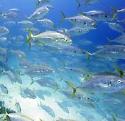 Over at Skeptical Science we (Doug Mackie, Christina McGraw, and Keith Hunter) have started a long series (18 parts) about ocean acidification (Introduction , 1, 2). We all deride blog science. Blog science is what happens when people try to get a complex message across in 800 words or less. Real science takes time to explain. There is too much et voila in writing about climate change in general and ocean acidification in particular. Denialists have not touched ocean acidification because they don’t understand it. The chemistry is very subtle and even posts on normally reliable blogs like Skeptical Science have made errors.
Over at Skeptical Science we (Doug Mackie, Christina McGraw, and Keith Hunter) have started a long series (18 parts) about ocean acidification (Introduction , 1, 2). We all deride blog science. Blog science is what happens when people try to get a complex message across in 800 words or less. Real science takes time to explain. There is too much et voila in writing about climate change in general and ocean acidification in particular. Denialists have not touched ocean acidification because they don’t understand it. The chemistry is very subtle and even posts on normally reliable blogs like Skeptical Science have made errors.
A local Dunedin denier sent me ‘proof’ that ocean acidification was not real and even if it was then it wasn’t a problem. The ‘proof’ was a document published by the SPPI. The document was previously ‘published’ (cough) in Energy and Environment. Really, they very best argument the denialists have is “acid means pH less than 7 but ocean pH is greater than 7 so there is therefore no acidification”.
In this document (which I am not linking to because they don’t need the traffic) 5 of the 12 points for policy makers are variations on the pH greater than 7 argument. At first I puzzled at this: Do they really think policy makers are so dumb they won’t notice the same thing said 5 ways? Then I remembered Don Brash and had to concede the point. Yes, many policy makers are that dumb. (6 more points in the summary for policy makers are variations of ‘the gravy train’ meme and the last point says that measurements to date agree with IPCC projections – while mangling the terminology).
Continue reading “Ocean acidification: How much is too much?”

 Perhaps it will register if it’s expressed in money terms. The latest issue of the New Scientist carries an
Perhaps it will register if it’s expressed in money terms. The latest issue of the New Scientist carries an  “The
“The